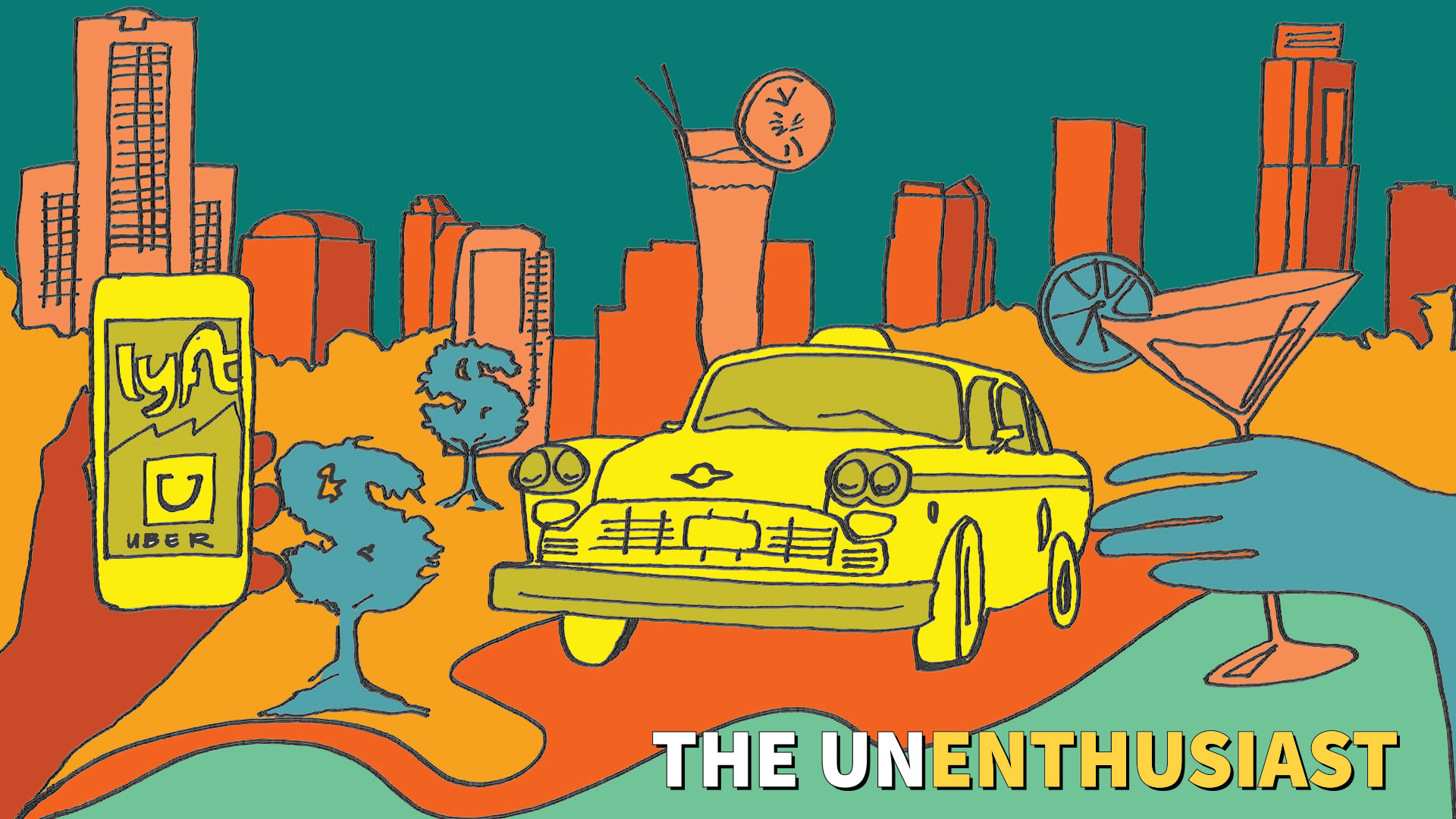

More than three people sent me the article when this headline appeared on the transom last week: “DWI Arrests Spike After Uber/Lyft Leave Austin.” My editor said, “7.5% More Drunky!” Uber and Lyft, the ride-sharing companies, bailed in a political dispute on May 9. Between then and May 31, there were 359 DWI arrests. In the same period last year, there were 334. The Austin Police Department issued the following statement: “Data set is too limited to draw any conclusions. However, anytime we experience an increase in DWI it is cause for concern.” The optics, as they say, are bad.
I’ve spent a lot of time, too much, really, thinking about Uber and Lyft leaving Austin. This is not an earthquake-style disaster. You have to know what’s going on to detect the problem. But it’s still deadly, like a gas leak.
After Uber and Lyft made good on their threat to blow town, thousands of people in Austin became commercial collateral damage in a war whose borders extend far beyond Texas. This isn’t about rider safety or bringing back groovy Austin culture. It’s part of a global struggle between two enormous economic entities. On one side, you have the old school, moribund taxicab lobby, and on the other, you have Uber, which respects workers’ rights, women’s safety, and local politics about as much as Silicon Valley millionaires respect San Francisco rent control laws.
This struggle first erupted in Paris, where struggles often erupt, when cabbies repeatedly staged worker actions against an Uber encroachment, leading to the hilarious spectacle of Courtney Love’s Uber being delayed on the way to the airport. “Paid some guys on motorcycles to sneak us out, got chased by a mob of taxi drivers who threw rocks, passed two police and they did nothing,” the Widow Cobain tweeted in 2015. The corporation that owns Yellow Cab has its headquarters in Paris, so they had a large army of darkness on which to draw. Still, the value of a cab license in Paris has plunged. The market forces are strong with Uber.
In the U.S., this war is playing out provincially. In Chicago, Mayor Rahm Emmanuel, whose brother is an Uber investor, ramrodded a lax city-council Uber ordinance that will spell the eventual death of Chicago cab companies. In California, where Uber and Lyft are headquartered, the state legislature is pushing forward equally lax regulations, opposed only by a shifty lawmaker whose family owns the largest cab company in San Diego.
Big Taxi doesn’t have a prayer.
Except in Austin. This is the only city in the world where the taxi lobby has won. Taxi has a long history of buying influence in Austin, a city large enough to have a cab industry, but small enough to still have a provincial, Jimmy Hoffa-era mentality when it comes to vehicular corruption, not to mention a public-transportation system that would be an embarrassment in a city a third of its size. Austin cabs offer limited, expensive, unaccountable service, by design, and because they can. The industry wants to maintain its monopoly at all costs.
Therefore, it’s ironic that after Uber and Lyft left town, the ride-sharing situation became a libertarian madhouse. I talked to Michael Leto, the CEO of a company called Fare, which was just beginning to beta-test its ride-sharing software in Phoenix when it all went down in Austin. “That Monday that Uber and Lyft pulled out,” he told me, “I was on the 12:30 flight to Austin, I met with the mayor’s development team that afternoon, and launched the following Friday.” Fare charges a flat $1.20 per mile, gives drivers an extra 10 percent off the top if customers use their reference numbers, and, unlike Uber and Lyft, lets its drivers take tips. Its current business model tries to ameliorate a major complaint about Uber, which is that drivers don’t make a living wage, leading to an endless churn of unreliable labor.
So on the one hand, you have a citywide startup incubator. Companies like Fare and Fasten (but not Boston-based SafeHer, whose entire reason for existing is to provide safe rides for women, another major knock against Uber) have popped up, providing limited, buggy, and not always disastrous services to locals. On the other hand, you have shady companies like GetMe, which refuses to reveal the identity of its CEO, and “peer-to-peer” services like Arcade City, which are accountable to no one, leading to the appalling spectacle of the city staging a sting against Arcade City drivers, impounding people’s private cars.
My little birds tell me that the city and Uber are currently having discussions. Fall is coming, and with it the Austin City Limits Festival, not to mention a University of Texas/Notre Dame football game. Eighty thousand drunken Irish people represent a civic emergency even in a city with a modern transportation system. A raft of Ubers would help clean up that mess. If not by fall, then something needs to be in place by spring, when South By Southwest once again soils our overstuffed shores.
I talked to several ride-sharing drivers this week. One of them, Kevin Reilly, is driving for both Fare and Fasten. He “gets more pings” with Fasten, but makes more money off his Fare tips. Beta glitches make both apps difficult to use, he says. Like a lot of Austinites, he’s just trying to make do, and doesn’t relish being part of some sort of impromptu car-app laboratory. This is not what he ordered.
“There is so much shit going on, this is legit, all these companies coming in and trying new things,” he says. “At the same time, every couple of days, I flip on my Lyft app, just in case it comes back. It worked so much better. Everyone got around. There was less drunk driving. It was a wonderful world.”